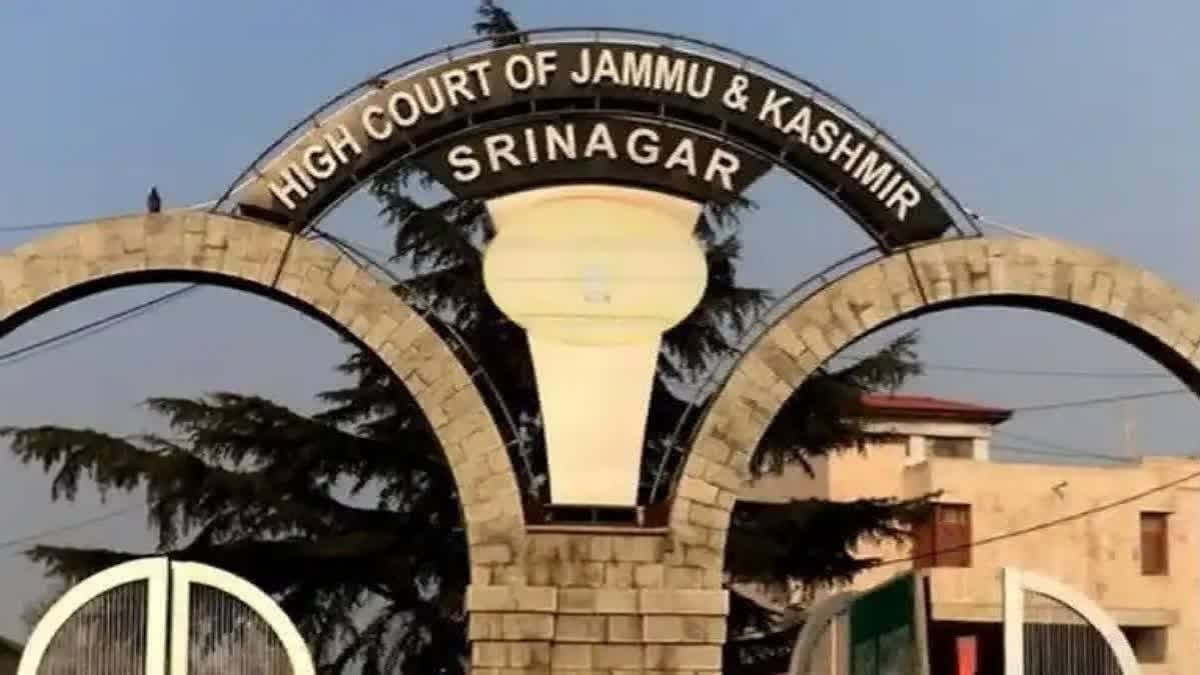Srinagar: In a significant ruling, the High Court of Jammu & Kashmir and Ladakh dismissed a review petition and fined the petitioner Rs 20,000 in a contentious child custody dispute while strongly rebuking the practice of labelling divorced women as "divorcees" in legal proceedings.
On Thursday (Feb 13, 2025), Justice Vinod Chatterji Koul dismissed the review plea filed by Parvez Ahmad Khan, who sought to overturn the court's October 18, 2022, judgment in RFA No. 04/2021. The case centred around a long-standing custody battle between Khan and his former wife, Areeb, who has primary guardianship of their minor son.
Khan's review petition argued that the previous ruling dismissed his appeal on merits without addressing the preliminary issue of maintainability. He contended that his case had been reserved for arguments solely on the appeal's admissibility and was not debated on its substance.
"...the matter was argued on the maintainability of the appeal and the case was reserved. Thus, the main appeal was not argued at all on merits; this Court has not decided the objection vis-à-vis maintainability of the appeal and instead decided the main appeal, which was not argued on merits at all...," the petitioner claimed in his review petition.
He further asserted, "The appeal has been decided without arguing the matter on merits and without hearing counsel for the petitioner on merits, a fact borne out by the records and interim orders."
However, the court firmly refuted this claim, asserting that the appeal had been heard and reserved on maintainability on June 1, 2022. "Reference has been made to Union of India vs. Sandur Manganese and Iron Ores Ltd to state that the principles of natural justice embody the right of every person to represent their interests before a court of justice. Pronouncing a judgment that adversely affects a party to the proceedings who was not given a chance to represent their case is unacceptable under the principles of natural justice," Justice Koul stated in his 33-page judgment.
Justice Koul further noted, "The appeal was heard and reserved on maintainability on June 1, 2022, and while rendering the judgment, this Court overlooked the interim orders and instead passed the judgment on merits..."
The Judge reiterated that the original ruling was 'legally sound' and aligned with established legal precedents. Citing the Supreme Court's stance on adjournments, Justice Koul remarked: "Adjournment after adjournment has become a tool which leads to strategic delays." The court reiterated the principle that justice delayed is justice denied, stressing the need to curb unwarranted delays that clog the judicial system.
The judgment further referenced the Supreme Court’s decision in M/s Shiv Cotex vs. Tirgun Auto P. Ltd (2011), stating: "It is sad, but true, that litigants seek—and courts grant—adjournments at the drop of the hat." Justice Koul noted that the courts must prevent litigants from using procedural delays to manipulate outcomes.
The case originated from a dispute over Khan's visitation rights. The trial court had earlier permitted him to meet his child twice a month, but modifications were sought due to logistical challenges faced by the mother, who had been appointed as a lecturer.
In its ruling, the court reaffirmed that "keeping in view the interest and welfare of the minor and the right of the petitioner, it is directed that the petitioner shall be permitted to meet the child on the last Friday of every month from 3 PM to 4 PM at the ADR Centre in Srinagar."
The judgment also required Khan to bear the child's educational expenses and pay a conveyance charge of Rs 500 per visit. "However, in case the petitioner fails to bear these expenses, the respondent shall always be free to pursue the appropriate legal remedy for the recovery of maintenance," the court added.
One of the most striking aspects of the ruling was the court's condemnation of Khan's use of the term "Divorcee" in the case title, which he had appended to his ex-wife's name. Justice Koul described the practice as "unbecoming" and reflective of Khan’s mindset.
"It is very painful to see how a woman, even as on today, is being treated. If a woman is labelled and shown as ‘Divorcee,’ as if it is her surname or caste, then a man who divorces his wife should also be called and suffixed as 'Divorcer', which, however, would be a bad practice," the judgment read. "Such a practice should be stopped—rather, crushed."
The court directed the Registrar Judicial to place the judgment before the Chief Justice for the issuance of a circular instructing that any legal document containing the word "Divorcee" in the cause title against a woman's name should neither be diarized nor registered.
In addition to dismissing the review petition, the court imposed a Rs 20,000 fine on Khan, to be deposited within one month. "In the event he fails to do so, the Registry shall take all necessary steps for its recovery," the court ruled.
Read More



